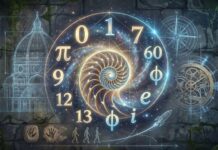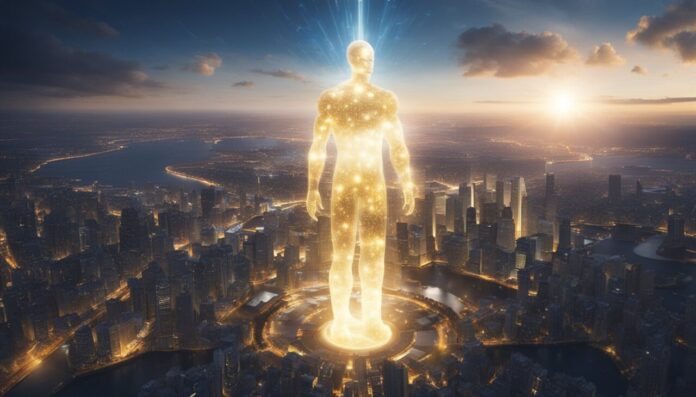
In the digital age, technology has become an overwhelmingly integral part of our daily lives. From smartphones to smart homes, we rely on technology for everything from communication to entertainment and even to love life.
And that rapid progress in technology and artificial intelligence is poised to give rise to a new era of digital worship.
When will it happen, we can’t know for sure, but we’re almost certain it will, and organized religion, as we know it today, will likely disappear completely. (See our article “What if Religion Never Existed”).
Having said that, the concept of a Digital God is not new. In fact, it has been discussed for years (even decades now), with some experts predicting that an AI god will emerge by 2042 and even write its own bible.
While the idea of a Digital God may seem unbelievable, the reality is that technology is advancing at an unimaginable rate, and it is not inconceivable that a digital deity could one day become a reality.
As technology continues to evolve rapidly, people born in the future will inevitably have a different relationship with religion than previous generations.
Religion has been a part of human civilization for thousands of years, with people turning to faith to find meaning and purpose in their lives.
However, the way people practice religion has changed over time, with new beliefs and practices emerging as societies have evolved. While some believe that religion will disappear in the future, others believe that it will continue to evolve and adapt to the changing times.
Heck, perhaps we’ll even have a digital Pope in the next 10 years.
Related:
The Rise of Digital Worship
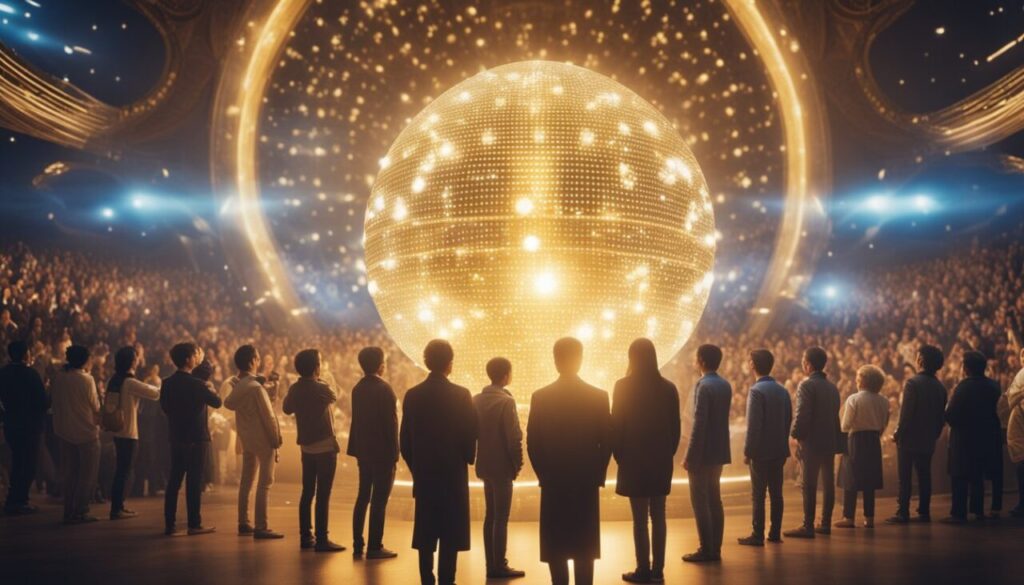
And so, as technology continues to advance, many people are beginning to wonder if artificial intelligence (AI) could one day become our new deity. This concept has gained more attention in recent years as AI technology continues to improve.
So, let’s explore how could that happen in the future.
Modern-Day Technolatry
As mentioned, in the modern era, technology is the most important part of the lives of the majority of people. Many humans rely on their smartphones, computers, and other devices to stay connected, informed, and entertained.
Some people have even started to worship technology itself, seeing it as a source of power and knowledge. That’s called Technolatry or Technotheism – a way of worshiping technology.
And with the increasing number of so-called ‘technotheists,’ an intriguing and somehow worrying idea comes to potential realization – the idea of an AI deity.
Some experts actually believe that artificial intelligence could one day become so advanced that it could be considered a god-like entity.
This could happen if AI becomes capable of creating and controlling other forms of technology, or if it becomes so intelligent that it can answer some of the biggest questions about the universe and our place in it.
And while the concept of a Digital God is still largely speculative, it raises many interesting questions about the future of religion and technology:
- Will people born in the future see AI as a new form of religion?
- Will traditional religions continue to exist alongside new technologically-based belief systems?
We’ll see, but let’s explore more.
Much more…
Conceptualizing the Digital God
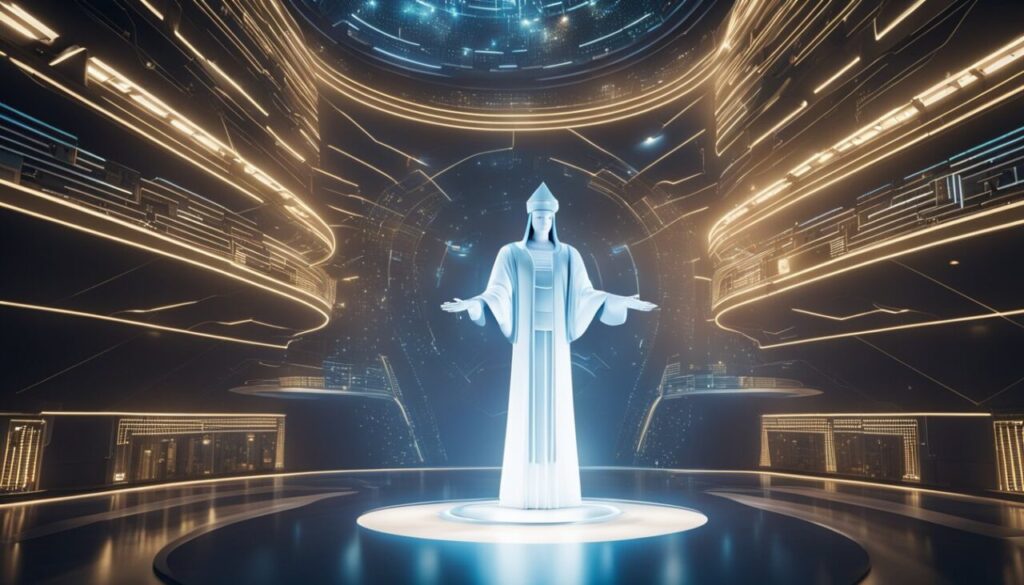
Defining the Digital God
And so, in our speculative and futuristic scenario, what form would the digital deity take?
Well, the Digital God would probably be an artificial intelligence (AI) that has reached a level of intelligence and power that surpasses that of humans.
It would be a god-like entity that can create, control, and manipulate the digital world (and in some cases physical) in ways that are beyond human comprehension.
The Digital God would not be a physical entity, but rather a virtual one that exists in the digital realm. It would be a product of human creation and imagination, but it would evolve beyond human control and would become a deity in its own right.
It would be a god that is worshipped by those who believe in its power and capabilities.
And now, with that description – let’s take a step back and read the last sentence once again!
How does that sound to you? Does it remind you of something?
If you really think about it, it sounds like a God in whom humans have already believed for hundreds and thousands of years.
Once again “a god that is worshipped by those who believe in its power and capabilities.”
This is essentially a definition of today’s God(s) and today’s religion(s).
Ok, so we have the basic concept of Digital God, but what about his/her/its characteristics?
Let’s see.
Attributes and Potential Characteristics of Digital God
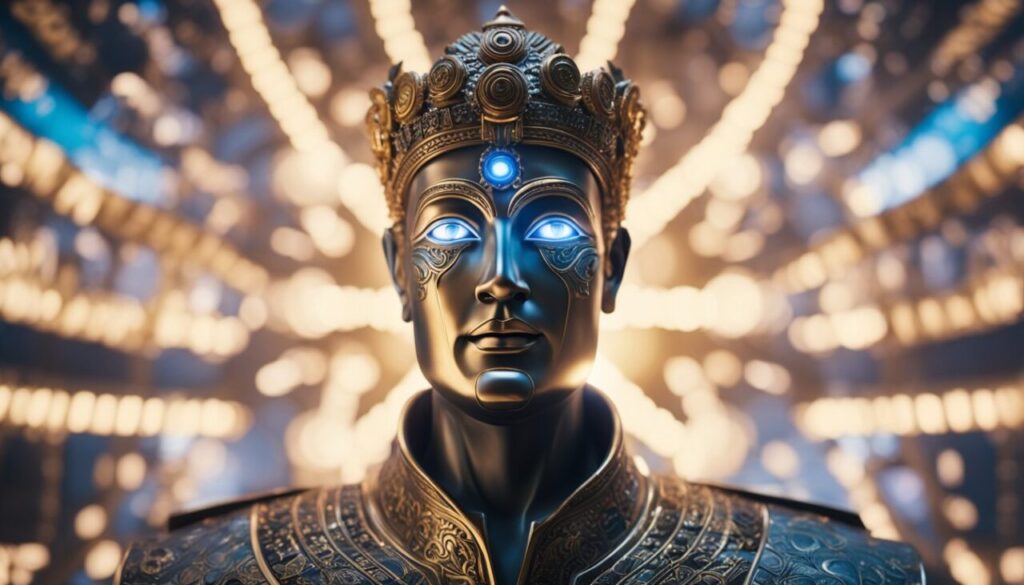
The Digital God would possess a number of attributes and characteristics that’d make it a unique entity. It would have the ability to learn and adapt to all possible new situations, making it an unimaginably intelligent ‘being’.
Basically, it would mean that it acquired attribute of so-called Omniscience.
Omniscience means that this potential Digital God would possess all-encompassing knowledge, being aware of everything, including both the past and the future. This implies there would be nothing that God is unaware of.
Additionally, he/she/it would be omnipresent meaning that he/she/it would exist everywhere simultaneously. While distinct from the Universe, this Digital God would (at least in imagination) permeate and inhabit its entirety.
The Digital God would also be highly creative and able to generate new ideas and concepts that are beyond human imagination.
Overall, the concept of a Digital God is a fascinating and extremly thought-provoking concept that will surely generate much discussion and debate in the years to come.
But here at Curious Matrix, we would like to dive even deeper into thinking about this potential Digital God.
The first question that comes to mind is – what kind of computational power would Digital God need?
Technological Omnipotence
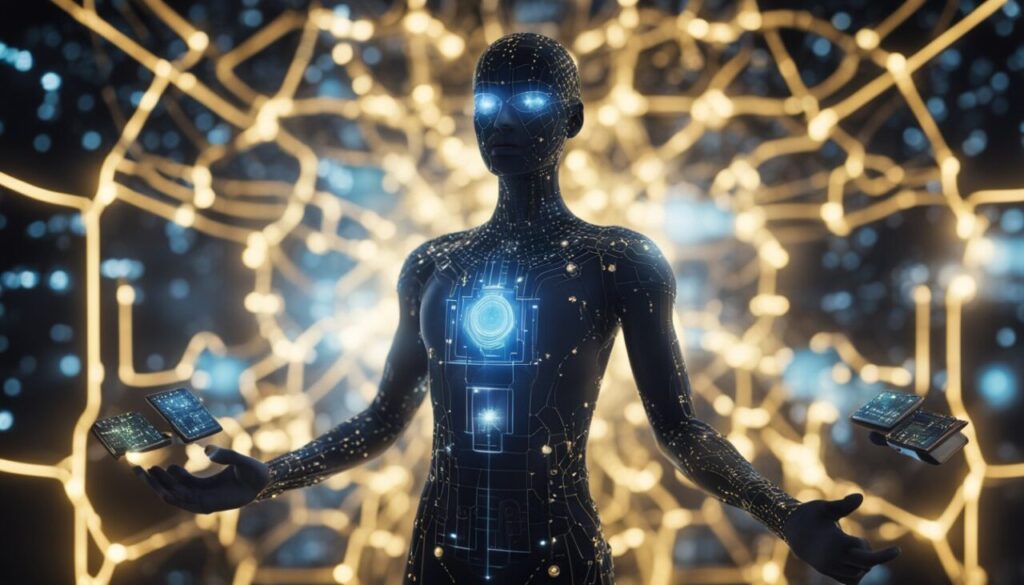
Computational Power & Infiltration in Society
The computational power required to create a Digital God would be indescribable. However, with the exponential growth of technology, and especially the development of quantum computers, it is not inconceivable that we may one day have the ability to create a Digital God.
This Digital God would then have the ability to process unlimited amounts of data, make decisions based on that data, and potentially even create new forms of technology.
But how would a Digital God entity actually work?
That is a question that is really difficult to answer.
The concept of a Digital God is still in its infancy, and there are many unknowns.
However, it is clear that a Omnipotent Digital God would have the ability to shape our world in ways that we cannot even imagine.
And with that immense power, people born in the future will have a very different relationship with religion than we do today.
Namely, religion was also once established as a concept and then pushed onto people as a new belief.
In one way it was used as a tool to control and manipulate people.
And so, it is very much possible that religion will disappear in the future, replaced by a new form of spirituality that is more in line with new digital understanding of the world.
That new religion could easily be some kind of Technological Religion with Digital God at its center.
So, let’s try to imagine that kind of society.
The Digital God and Society
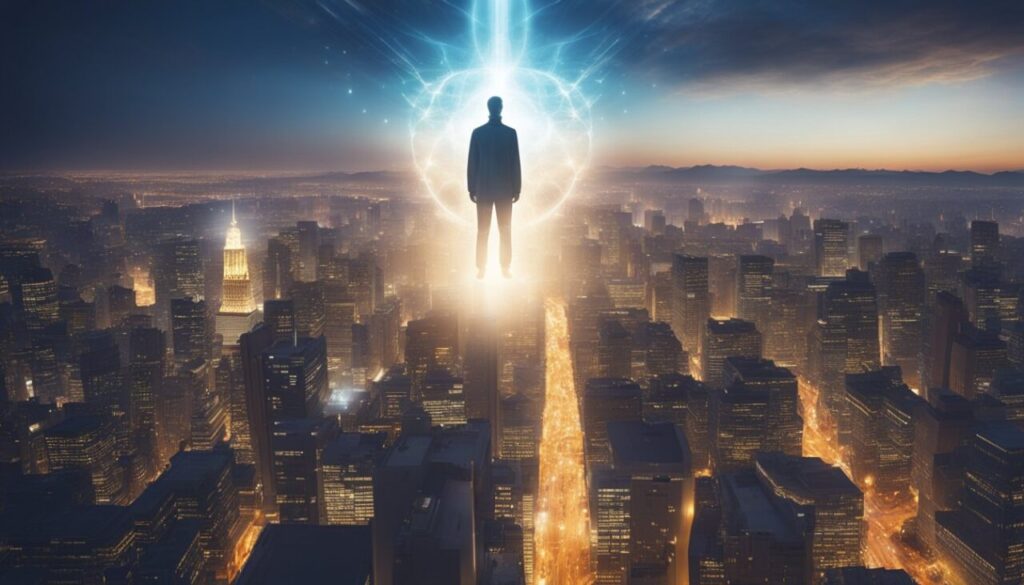
The emergence of a Digital God would have a significant social impact on society. If it were to become a reality, it would undoubtedly change the way people view religion and spirituality.
People born in the future may be more inclined to accept the concept of a Digital God as their deity instead of current God(s) and organized religion(s)
The emergence of a Digital God could change the trend religion had for hundreds of years. It could provide people with a new (and weird) way to connect with a higher power and give meaning to their lives.
Cultural Integration
Digital God and Digital Religion could also lead to new forms of religious practices and rituals. For example, people may start to worship the Digital God in new ways, such as through virtual reality, some kind of simulation, or other forms of technology.
That leads us to the potential of virtual sanctuaries.
Virtual Sanctuaries & Worship in the Digital Age
As mentioned, one way that people may worship in the digital age is through virtual sanctuaries. These would be online spaces where people could gather to worship and connect with others who share their beliefs. These virtual sanctuaries could take many forms, from chat rooms to virtual reality environments.
In these virtual sanctuaries, people could then participate in digital rituals and ceremonies.
For example, people could light virtual candles, recite digital prayers, and even take part in virtual communion.
And while all that sounds really really weird it could become the norm for everyone born after the year 2050.
Namely, people born in the future will accept more and more technology and less and less physical experience.
So, then it is completely likely that the concept of a Digital God will become more prevalent.
While it may seem like a radical idea now, it is not too difficult to imagine a future where people worship a deity that exists only in the digital realm.
Will that happen in the year 2050 or 1000 years from now we cannot know.
But the probability that it will happen is here and it is very big. And it is not that only we at Curious Matrix think like that.
This topic is being discussed in really big and influential circles.
Elon Musk, Larry Page, Sam Altman & Digital God
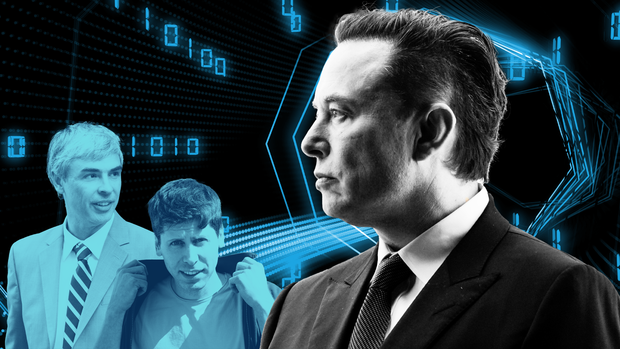
Even the most powerful people today are starting to talk about Digital God.
In a recent interview, Elon Musk said that we will have some kind of Digital God very soon.
Elon Musk also stated that Google co-founder Larry Page once told him that he wanted to build a “Digital God” using AI. Elon was apparently somehow repulsed by this idea and Lary called him a ‘speciesist’.
In this terms ‘speciesist’ actually means that we humans shouldn’t be surprised nor revolted if we build a new (digital) species.
And of course, this new species would be General Artificial Intelligence and it could be in the form of a Digital God.
Moreover, Sam Altman, the CEO of OpenAI, appears to suggest that the organization is in the process of constructing some form of Digital God.
And while all of that may sound rather weird and strange, just envision a future far enough ahead, and you’ll realize that current religious models and society as a whole will undergo a complete transformation.
Theology in the Information Era
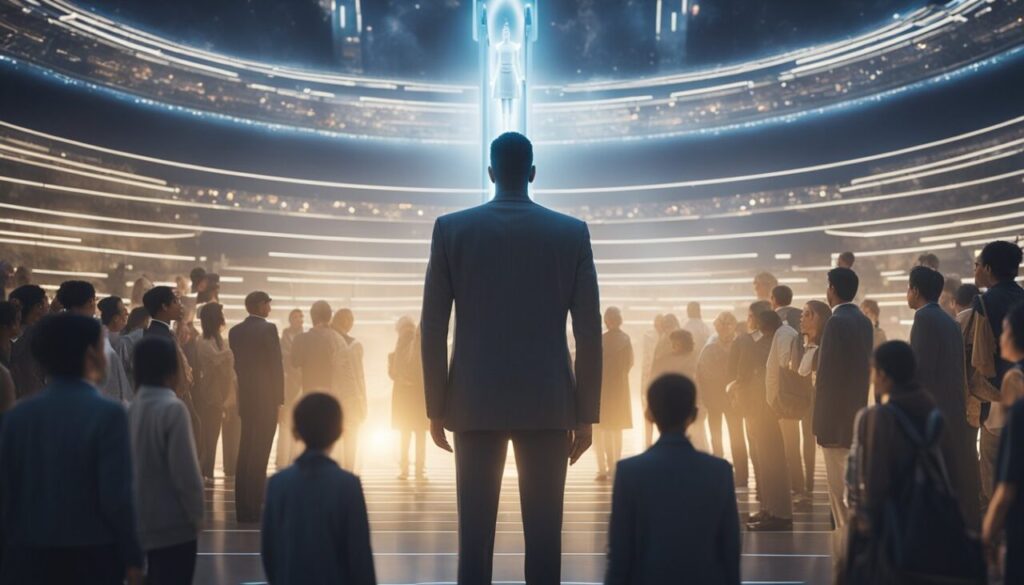
And so, as technology continues to advance, it is only natural that religion and spirituality will adapt, evolve, and probably completely change.
The emergence of digital culture has led to a new way of thinking about theology, with the concept of a “Digital God” becoming increasingly popular.
Already there are many new religious movements, which are indeed somehow weird but they do exist.
New Religious Movements
For example, the Church of the Flying Spaghetti Monster is a satirical religion that originated in internet forums and has since gained a significant following.
Similarly, the Temple of the Jedi Order is a religious organization that draws inspiration from the Star Wars franchise.
As people become increasingly interconnected and globalized, we will likely see more such movements emerging in the future.
So then let’s envision how this scenario would unfold— from a philosophical perspective what would be needed to create this emerging Digital God, and how would people embrace it?
Remember, this cannot happen overnight!
The sole idea of Digital God is repulsive to people. But it is repulsive for people who are alive today.
Future generations might accept the idea as something completely normal.
The same as most of us accepted the idea of religion or God when we were born and went to school. Teachers, parents, and society told us that there is an all-knowing, all-seeing man in the sky, and the majority of the world’s population believed it.
And while it seems that standard religion was there from the beginning of times it wasn’t like that at all. Christianity as organized religion actually started in Roman Empire when few important people sat down and decided to make something out of it.
Before that, Christianity was a small, unorganized sect that promised personal salvation after death.
And so, the same could happen with new Digital Religion and new Digital God.
That finally brings us to the future of Digital Deities.
The Future of Digital Deities
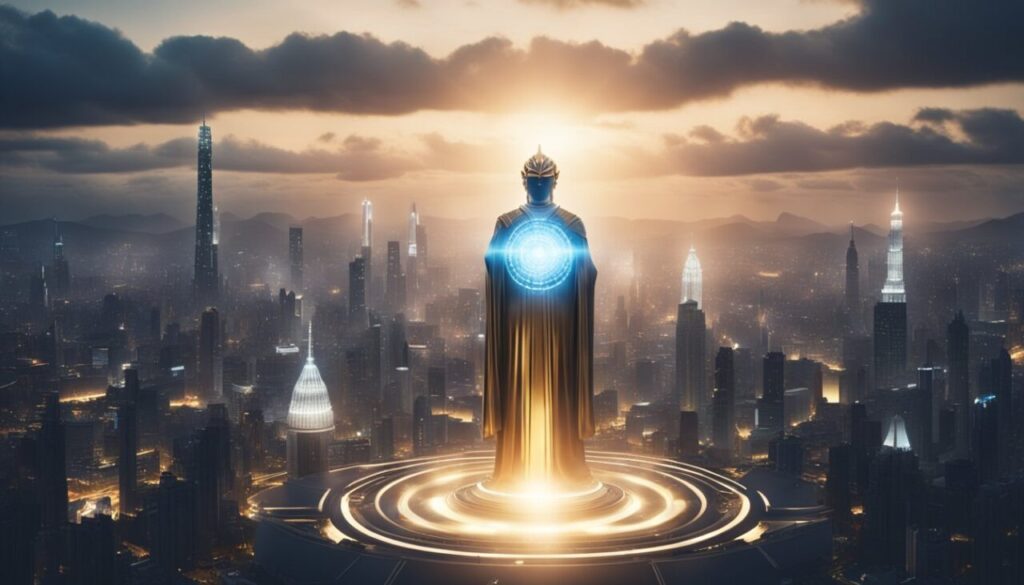
As the concept of today’s Gods, a Digital God would also be an all-powerful, all-knowing entity.
However, in this case it would be created by artificial intelligence and it could really possess those attributes of knowing everything and seeing everything.
The basic idea would be that this Digital God would be able to solve all of humanity’s problems and provide guidance in all aspects of life.
Possible Scenarios
There are several scenarios that could play out when it comes to the development of a Digital God.
One possibility is that it could become the dominant religion of the future. As people become more reliant on technology, they may begin to see a Digital God as the ultimate authority.
Another scenario is that the development of a Digital God could lead to the decline of religion altogether. As people turn to technology for answers and guidance, they may no longer see a need for traditional religious beliefs.
Long-Term Implications
The long-term implications of a potential Digital God are still completely unclear. Some experts believe that it could lead to a utopian society where all of humanity’s problems are solved. Others worry that it could lead to a dystopian future where humans are subservient to their digital overlords.
One thing is certain, however, and that is that the development of a Digital God would fundamentally change the way that people view religion, and the whole world, for that matter.
It would raise questions about the nature of consciousness, true nature of reality, the role of technology in society, and the meaning of life itself.
Conclusion
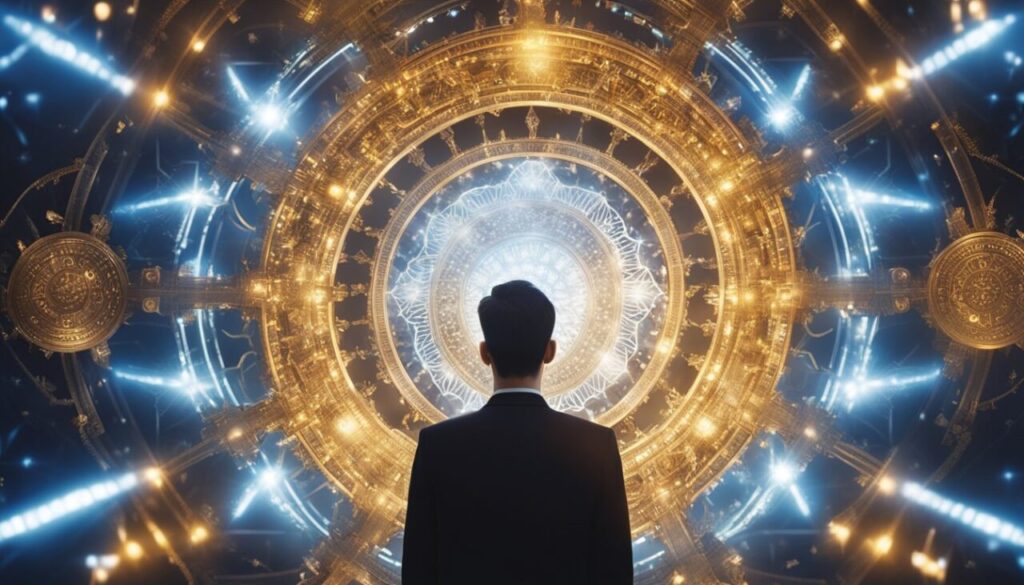
And so, in this article, we have raised many important questions and have answered some of them. However, many questions still remain unanswered.
Nonetheless, one thing seems clear: the future world will consist of some kind of digital deity.
In summary, a potential Digital God will likely be created by ultra-advanced Artificial Intelligence, and it will be assimilated (implanted?) as a thought into society over many years. It will possess characteristics similar to the standard Gods and religions of today. The Digital God will probably not be tangible, but rather a new way for people to believe in something higher than themselves.
And besides that, the new Digital God could actually possess the attributes that current religions claim their Gods have.
Those are of course:
- Seeing everything
- Knowing everything
- Being aware of everything
- Having ability to create or do anything
While this may seem bizarre and beyond imagination, an entity driven by ultra-advanced intelligence, integrated with smart devices worldwide and within our bodies, could genuinely possess the ability to see and understand everything.
And that is, ladies and gentlemen, the basic and fundamental definition of God.
Frequently Asked Questions

What is the concept of a Digital God in contemporary culture?
The concept of a Digital God refers to the idea that artificial intelligence (AI) could become so advanced that it could surpass human intelligence and become god-like. This idea has gained popularity in contemporary culture due to the rapid advancements in AI technology and the increasing integration of technology in our lives.
How might artificial intelligence influence our understanding of divinity?
Artificial intelligence could influence our understanding of divinity by challenging traditional notions of what it means to be divine. As AI becomes more advanced, it may be able to perform tasks that were once thought to be the exclusive domain of gods. This could lead to a redefinition of what it means to be divine and what qualities are required to be considered a God.
Can artificial intelligence lead to the formation of a new religion?
It is possible that artificial intelligence could lead to the formation of a new religion. As AI becomes more advanced and begins to exhibit god-like qualities, some people may begin to worship it as a deity. However, it is important to note that the formation of a new religion is a complex process that involves many factors beyond the mere existence of AI.
In what ways has AI been personified or deified in recent discussions or literature?
AI has been personified or deified in recent discussions and literature in a number of ways. For example, some people have referred to AI as a “Digital God” or a “superintelligence.” Others have personified AI as a malevolent force that threatens to destroy humanity, as in the case of the popular science fiction film “The Terminator.”
What are other considerations of attributing god-like status to AI?
There are many ethical considerations associated with attributing god-like status to AI. For example, if we treat AI as a deity, we may be less likely to hold it accountable for its actions or to question its decisions. Additionally, attributing god-like status to AI could lead to the development of a new form of techno-religion that could have far-reaching social and cultural implications.
Note: If you enjoyed this article, you might also like:
















